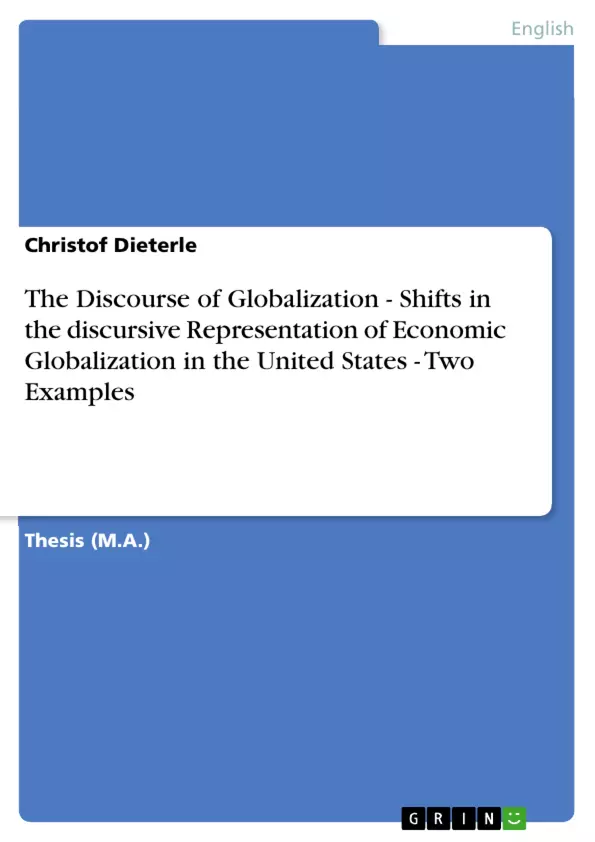1The term globalization has gained a lot of prominence during the last two decades. First introduced into the public and academic debate in the 1960s, it has become a “buzz-word” indicating widespread changes in the realms of politics, culture and, most important, economies around the world since the end of the Cold War and the demise of the bi-polar system in the early 1990s. However, after having been discussed for more than two decades, the concept of globalization still is a contentious issue in public debate as well as in academic circles. In fact, looking at the vast amount of, often quite contradictory, literature on the topic, globalization can be regarded as one of the most controversially discussed issues in the public and academic2sphere. Controversies not only exist regarding the question of who benefits from the, vaguely defined, globalization process, but also regarding the very basic question whether globalization really exists or is just an exaggerated view on a process which has taken place for a long time (Held et al. 1999, Hirst and Thompson 1996,Ohmae 1990).
Table of Contents
- Introduction
- Discourse: Theoretical and methodological perspectives
- What is Discourse?
- General Usage
- Structural Linguistics
- Habermas' Normative Approach to Discourse
- Michel Foucault's Discourse Theory
- Post-Marxist Perspectives on Discourse
- Methodological Perspectives
- Historical Semantics
- Critical Discourse Analysis (CDA)
- Methodological Framework
- The Discursive Framework
- Discursive Framework I: Economic Data
- Global Economic Trends
- The United States and the Global Economy
- Discursive Framework II: The Globalization Debate
- The Globalist Perspective
- The Sceptic Perspective
- The Transformationalist Perspective
- Summary
- Analysis
- Discursive Events
- The Foundation of the WTO
- The "Battle of Seattle"
- The Terrorist Attacks on the World Trade Center
- The Corpus
- General Overview
- Step I: General Word Count
- Step II: Word Count Regarding Discursive Events
- Step III: Connotations of the Term “Globalization”
- Textual Analysis
- Selection of Sample Texts
- Text Analysis and Interpretation
- Summary
Objectives and Key Themes
This study investigates the evolution of the discursive representation of economic globalization in the United States, drawing on insights from linguistics and social sciences. It aims to explore how the discourse on globalization has changed over time and the social factors that influence this transformation.
- The relationship between language and the representation of globalization in a discursive context.
- The impact of social events and power relations on the shifting discursive representation of globalization.
- The role of economic data and the globalization debate in shaping the discourse on globalization.
- The analysis of the discourse on globalization through the lens of textual analysis and critical discourse analysis.
- The influence of social reality on the dynamics of discourse and how it shapes public understanding of complex issues.
Chapter Summaries
- Introduction: This chapter introduces the concept of globalization and its significance in the context of the US economy. It presents the research question, which focuses on the evolution of the discursive representation of globalization in the United States. The chapter also discusses the research design and methodology.
- Discourse: Theoretical and methodological perspectives: This chapter provides an overview of discourse theory, outlining different theoretical perspectives on the relationship between discourse and social sciences. It examines various approaches to discourse analysis, including structural linguistics, Habermas' communicative action, Foucault's discourse theory, and post-Marxist perspectives. The chapter concludes with the establishment of the methodological framework used in the study.
- The Discursive Framework: This chapter explores the environment in which the discourse on globalization takes place. It examines the development of the global economy during the analyzed time period and the academic debate on globalization, including the globalist, sceptic, and transformationalist perspectives.
- Analysis: This chapter delves into the analysis of the discursive events surrounding globalization, focusing on specific events such as the foundation of the World Trade Organization (WTO), the "Battle of Seattle," and the terrorist attacks on the World Trade Center. It examines the corpus of data used in the study and provides a general overview of the word count and connotations of the term "globalization." The chapter also includes a textual analysis of selected sample texts, focusing on their interpretation and analysis.
Keywords
The main keywords and focus topics of the text include: economic globalization, discourse analysis, critical discourse analysis, discursive representation, social reality, power relations, global economy, US economy, discursive events, textual analysis, the World Trade Organization (WTO), the "Battle of Seattle," the terrorist attacks on the World Trade Center.
Frequently Asked Questions
How has the discourse on globalization changed in the US?
The study investigates shifts in the discursive representation of economic globalization, looking at how language and public understanding have evolved in response to major social events.
Which specific events are analyzed in this globalization study?
The analysis focuses on three key "discursive events": the foundation of the WTO, the "Battle of Seattle" protests, and the terrorist attacks on the World Trade Center.
What theoretical perspectives on discourse are explored?
The study reviews perspectives from structural linguistics, Habermas' normative approach, Michel Foucault's discourse theory, and post-Marxist views.
What are the three main perspectives in the globalization debate?
The text categorizes the debate into the Globalist perspective, the Sceptic perspective, and the Transformationalist perspective.
How does the study analyze the term 'globalization'?
It uses a methodological framework involving word counts, analysis of connotations, and textual analysis to see how the term is used in different contexts.
What is the role of 'social reality' in discourse dynamics?
The research argues that social reality and power relations directly influence how globalization is represented in language and public debate.
- Arbeit zitieren
- Christof Dieterle (Autor:in), 2006, The Discourse of Globalization - Shifts in the discursive Representation of Economic Globalization in the United States - Two Examples, München, GRIN Verlag, https://www.grin.com/document/55427



